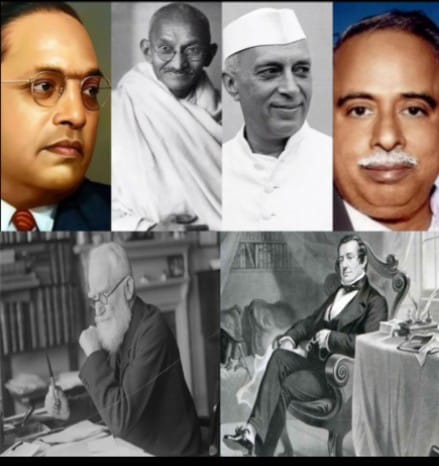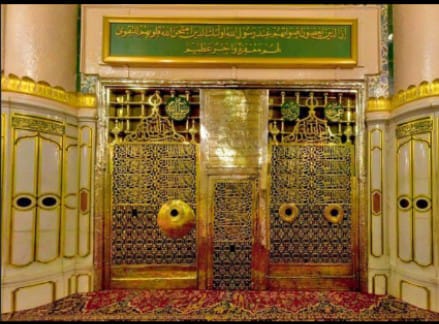– M Rafi Ahmed
At a time when Seerat-un-Nabi is being observed today across the globe which marks the birth anniversary of Prophet Muhammad ﷺ, it’s apt to recall the inspiring words on Prophet Muhammad ﷺ quoted by leading luminaries right from noted writers, politicians and leaders which add colour to the Seerat-un-Nabi fete. Rooted in Islamic history, it is celebrated with prayers, charity, and community gatherings. Moreover, it highlights the Prophet’s teachings of compassion, peace, and unity among the people.

Mahatma Gandhi’s inspiration from Prophet Muhammad ﷺ: He had said: “I wanted to know the best of the life of one who holds today undisputed sway over the hearts of millions…I became more than ever convinced it was the rigid simplicity, the utter self-effacement of the Prophet, the scrupulous regard for pledges, his intense devotion to his friends and followers, his intrepidity, his selflessness, his absolute trust in God and his own mission.”
While the first Prime Minister of Independent India Jawaharlal Nehru wrote in one of his essays thus: “The ethics of the Prophet of Islam exceeded all borders and we consider him an example for all reformers who would like to walk in the world to real peace.”
Meanwhile, Baba Saheb Dr Ambedkar acknowledges the role of religious revolution brought about by Prophet Muhammad ﷺ and its impact on the subsequent political power gained by Arabs. He said: “Before the Arabs became a political power they had undergone a thorough religious revolution started by the Prophet Mohammad.” To be precise, Dr Ambedkar spoke about the Greatness of Prophet Muhammad ﷺ.
Commenting on the unparalleled and extraordinary success of Prophet Muhammad, the architect of Indian Constitution had said: “No man ever arrogated to himself the virtue of being a Prophet with so little equipment, but he made bold and the faith which, under the name of Islam, he preached to his family and nation is compounded of an eternal truth and a necessary fiction. “That there is only one God, and that Mahomet is the apostle of God.”
Writing on the topic of the legacy of Muslim rulers, Ambedkar wrote: “They did a positive act, namely, to plant the seed of Islam. The growth of this plant is remarkable. It is not a summer sapling. It is as great and as strong as an oak. Its growth is the thickest in Northern India. The successive invasions have deposited their ‘silt’ more there than anywhere else, and have served as watering exercises of devoted gardeners.
Rev Borsworth Smith, an English academician, school master, man of letters and author, had said: “He was Caesar and Pope in one; but he was Pope without Pope’s pretensions, Caesar without the legions of Caesar: without a standing army, without a bodyguard, without a palace, without a fixed revenue; if ever any man had the right to say that he ruled by the right divine, it was Mohammed, for he had all the power without its instruments and without its supports.”
Former Tamil Nadu Chief Minister and DMK leader C N Annadurai, while addressing at the Seerat-un-Nabi fete at the then Madras Marina Beach in 1957, said: Islam isn’t a religion, it’s a way of life wherein Prophet Muhammad Nabi preached and practised. Similar was his views about Prophet Muhammad wherever he spoke across Tamil Nadu.
Noted Irish born playwright and critic George Bernard Shaw noted: “He must be called the Saviour of Humanity. I believe that if a man like him were to assume the dictatorship of the modern world, he would succeed in solving its problems in a way that would bring it much needed peace and happiness.” (The Genuine Islam, Singapore, Vol.1, No.8, 1936)
He was by far the most remarkable man that ever set foot on this earth. He preached a religion, founded a state, built a nation, laid down a moral code, initiated numerous social and political reforms, established a powerful and dynamic society to practice and represent his teaching and completely revolutionised the worlds of human thought and behaviour for all times to come. His name is Muhammad ﷺ.
English historian, politician and essayist Edward Gibbon remarked, “The greatest success of Mohammad’s life was affected by sheer moral force without the stroke of a sword.”
American astronomer Michael H. Hart said thus: “My choice of Muhammad to lead the list of the world’s most influential persons may surprise some readers and may be questioned by others, but he was the only man in history who was supremely successful on both the religious and secular level.”
Endorsing similar views, American writer and diplomat Washington Irving had this to say: Prophet Muhammad treated friends and strangers, the rich and poor, the powerful and the weak, with equity, and was loved by the common people for the affability with which he received them, and gave a patient hearing to their pleas.
[The author is former Indian Express and Deccan Chronicle chief]




